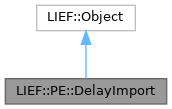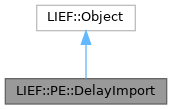Class that represents a PE delayed import. More...
#include <DelayImport.hpp>


Public Types | |
| using | entries_t = std::vector<std::unique_ptr<DelayImportEntry>> |
| using | it_entries = ref_iterator<entries_t&, DelayImportEntry*> |
| using | it_const_entries = const_ref_iterator<const entries_t&, const DelayImportEntry*> |
| Public Types inherited from LIEF::Object | |
| template<class T> | |
| using | output_t = add_pointer_t<decay_t<T>> |
| template<class T> | |
| using | output_const_t = add_pointer_t<add_const_t<decay_t<T>>> |
Public Member Functions | |
| DelayImport ()=default | |
| DelayImport (const details::delay_imports &import, PE_TYPE type) | |
| DelayImport (std::string name) | |
| ~DelayImport () override=default | |
| DelayImport (const DelayImport &other) | |
| DelayImport & | operator= (DelayImport other) |
| DelayImport (DelayImport &&) noexcept=default | |
| DelayImport & | operator= (DelayImport &&) noexcept=default |
| void | swap (DelayImport &other) |
| uint32_t | attribute () const |
| According to the official PE specifications, this value is reserved and should be set to 0. | |
| void | attribute (uint32_t hdl) |
| const std::string & | name () const |
| Return the library's name (e.g. kernel32.dll). | |
| void | name (std::string name) |
| uint32_t | handle () const |
| The RVA of the module handle (in the .data section) It is used for storage by the routine that is supplied to manage delay-loading. | |
| void | handle (uint32_t hdl) |
| uint32_t | iat () const |
| RVA of the delay-load import address table. | |
| void | iat (uint32_t iat) |
| uint32_t | names_table () const |
| RVA of the delay-load import names table. The content of this table has the layout as the Import lookup table. | |
| void | names_table (uint32_t value) |
| uint32_t | biat () const |
| RVA of the bound delay-load import address table or 0 if the table does not exist. | |
| void | biat (uint32_t value) |
| uint32_t | uiat () const |
| RVA of the unload delay-load import address table or 0 if the table does not exist. | |
| void | uiat (uint32_t value) |
| uint32_t | timestamp () const |
| The timestamp of the DLL to which this image has been bound. | |
| void | timestamp (uint32_t value) |
| it_entries | entries () |
| Iterator over the DelayImport's entries (DelayImportEntry). | |
| it_const_entries | entries () const |
| Iterator over the DelayImport's entries (DelayImportEntry). | |
| void | accept (Visitor &visitor) const override |
| Public Member Functions inherited from LIEF::Object | |
| Object () | |
| Object (const Object &other) | |
| Object & | operator= (const Object &other) |
| Object (Object &&other) noexcept=default | |
| Object & | operator= (Object &&other) noexcept=default |
| template<class T> | |
| output_t< T > | as () |
| template<class T> | |
| output_const_t< T > | as () const |
| virtual bool | operator== (const Object &other) const |
| virtual bool | operator!= (const Object &other) const |
| virtual | ~Object () |
Detailed Description
Class that represents a PE delayed import.
Member Typedef Documentation
◆ entries_t
| using LIEF::PE::DelayImport::entries_t = std::vector<std::unique_ptr<DelayImportEntry>> |
◆ it_const_entries
| using LIEF::PE::DelayImport::it_const_entries = const_ref_iterator<const entries_t&, const DelayImportEntry*> |
◆ it_entries
Constructor & Destructor Documentation
◆ DelayImport() [1/5]
|
default |
Referenced by DelayImport(), DelayImport(), operator<<, operator=(), operator=(), and swap().
◆ DelayImport() [2/5]
| LIEF::PE::DelayImport::DelayImport | ( | const details::delay_imports & | import, |
| PE_TYPE | type ) |
◆ DelayImport() [3/5]
|
inline |
References name().
◆ ~DelayImport()
|
overridedefault |
◆ DelayImport() [4/5]
| LIEF::PE::DelayImport::DelayImport | ( | const DelayImport & | other | ) |
References DelayImport().
◆ DelayImport() [5/5]
|
defaultnoexcept |
References DelayImport().
Member Function Documentation
◆ accept()
|
overridevirtual |
Implements LIEF::Object.
◆ attribute() [1/2]
|
inline |
According to the official PE specifications, this value is reserved and should be set to 0.
References attribute().
Referenced by attribute().
◆ attribute() [2/2]
|
inline |
◆ biat() [1/2]
|
inline |
RVA of the bound delay-load import address table or 0 if the table does not exist.
◆ biat() [2/2]
|
inline |
◆ entries() [1/2]
|
inline |
Iterator over the DelayImport's entries (DelayImportEntry).
◆ entries() [2/2]
|
inline |
Iterator over the DelayImport's entries (DelayImportEntry).
◆ handle() [1/2]
|
inline |
The RVA of the module handle (in the .data section) It is used for storage by the routine that is supplied to manage delay-loading.
◆ handle() [2/2]
|
inline |
◆ iat() [1/2]
|
inline |
RVA of the delay-load import address table.
Referenced by iat().
◆ iat() [2/2]
|
inline |
References iat().
◆ name() [1/2]
|
inline |
Return the library's name (e.g. kernel32.dll).
Referenced by DelayImport(), and name().
◆ name() [2/2]
|
inline |
References name().
◆ names_table() [1/2]
|
inline |
RVA of the delay-load import names table. The content of this table has the layout as the Import lookup table.
◆ names_table() [2/2]
|
inline |
◆ operator=() [1/2]
|
defaultnoexcept |
References DelayImport().
◆ operator=() [2/2]
|
inline |
References DelayImport(), and swap().
◆ swap()
| void LIEF::PE::DelayImport::swap | ( | DelayImport & | other | ) |
References DelayImport(), and swap().
Referenced by operator=(), and swap().
◆ timestamp() [1/2]
|
inline |
The timestamp of the DLL to which this image has been bound.
◆ timestamp() [2/2]
|
inline |
◆ uiat() [1/2]
|
inline |
RVA of the unload delay-load import address table or 0 if the table does not exist.
According to the PE specifications, this table is an exact copy of the delay import address table that can be used to to restore the original IAT the case of unloading.
◆ uiat() [2/2]
|
inline |
The documentation for this class was generated from the following file:
Generated by